Does this really exist? As in Scottish High tea? Or is this another adorable Scottish fable….like the Haggis sheep? Personally, I don’t know what to make of it…considering that when I did a Google search, I got a mix of responses. One, which had me reeling with laughter. Perhaps it does exist…after all…and is not a mere figment of the good ole Scot’s super active grey matter!
And should it all be a tattle tale…then I’d much rather live in ‘my fantasy’ of delicious salted chocolate caramel shortbread and yoghurt pots, scones with Lemon Thyme curd and cream…. and Tea….oh, the wonders of blooming teas (more Chinese than Scottish , I know but I’m not nit-picking). Totally amazing…it were as though I was underwater snorkeling and at the same time watching something unique being born! Not to be missed. The yellow flowers in this are Marigolds …..
[youtube https://www.youtube.com/watch?v=_rhIOj4v8MU&hl=en&fs=1&rel=0&color1=0xcc2550&color2=0xe87a9f&border=1]
Bill Patterson describes ‘Scottish High Tea’ so well:
‘….Only available in Scotland to exceptionally lucky people. Linked to the Great Scottish Traditional Hotel is the Great Scottish Traditional High Tea.
This meal is unique to Scotland and has as much claim to be a genuine Scottish innovation as the haggis or that game where misguided people try and hit a small white ball around fields. The high tea came about in Scotland because, in the good old days, many had to rise early for work and, consequently, their hours were skewered. Breakfast was early and then, as the day was darkening and not much more could be done, hungry workers ate their main meal of the day around 4 o’clock in the afternoon.
‘High’ was the term used to denote that the meal was being eaten at the main table and not at any small side table which might have been used for breakfast or a drink of tea. High tea was intended to be the main meal of the day in many houses in Scotland.

In this it varied from the English high tea which is credited to Anna, Duchess of Bedford, as the creator, who claimed she suffered from ’a sinking feeling’ around late afternoon and started the fashion of snacking on tea, sandwiches and cakes.

Today, when you can get it, the Great Scottish Traditional High Tea offers better value than the later ’dinner’ with much the same food available but, if truly traditional, not served in such a fancy manner (nay Nouvelle Cuisine nonsense here). It starts with continuous tea and toast well supplied with butter and the main course can be steak pie or fish or bacon and eggs; then follows a mixture of scones, crumpets and fancy cakes
— enough to delight a Billy Bunter or a Tracy Tupman. Of course, the teapots must all be heavy and unwieldy…..

…and you will need a sufficiency of table napkins.
Avoid, where possible, those modern hotels and hostelries offering a ’traditional’ Scottish High Tea. They are generally portion-controlled places run from without Scotland and four squares of a toast and one stodgy scone is your lot. Some even have haggis on the menu under the mistaken believe that this is a traditional Scottish dish. It may be but it has no place in the traditional Scottish High Tea.

Do come and try it — you’ll even learn to love the rain; and when you do get a good day in Scotland…’

Now my version is a conglomerate of little nibbles….some of which can be made days ahead of time, served with a delightful pot of ‘Tea’ and a healthy offering of good company.
I must talk about the Tea….because it is really special. I mean, up till a few months ago, I had never come across Flowering Teas, Tea blossoms or Blooming teas? Of course I had to buy them the minute I saw them at a delightful Tea & Coffee shop in Leiden. Under strict instructions from the store attendant that a glass pot was essential, I purchased 4 bulbs (@ 1 Euro/bulb. Each bulb can be reused anywhere from 5-15 times! Talk about a bargain).
Step 2 – Getting a glass teapot.
And to round off my Scottish High Tea – I brewed some blossoms. It was like magic and the kids and I crowded round the Teapot as it brewed. That little bit of red peeking through the ball….a Jasmine blossom which unrolls and unfurls and literally ‘blooms’!
The tea is delicious and golden with fragrant, floral overtones….Brew the bulb as many times as you like, you’ll get no bitterness with age! Refreshing, and magical. Oh, what a delight it is.

So that’s it L&G….hope you enjoyed the post and if you’re in Scotland, be sure to avail yourself of their High tea, will you?
If you decide to stay home, here are the recipes. You can plan ahead and start the preparations some time before.
The week before
Reduced-fat Lemon-thyme curd
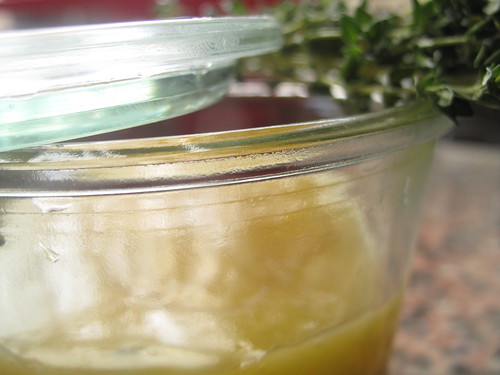
The key to making curds without a boiler is low heat and constant stirring; Reduced-fat?…. Use ice cold butter!
Makes about 180ml / or a small – medium jar! You’ll need 1 egg 1 egg yolks…or in my case, 1 double-yoked egg (and yes you read me well….an egg with 2 yolks) 80g granulated sugar or vanilla sugar 40 – 60 gm ice cold butter, cut into about 10 pieces (as opposed to the 80g in the recipe from my friend, E of the pizza fame) Rind & juice of 1 lemon Lemon thyme leaves Directions Whisk eggs in a bowl Sieve into a pan – to remove thick bits of yolk Add sugar to egg mix and stir till its a soft mixture Put pan on very low heat on your stove top – you want the mix to cook, not fry! (If you want scrambled eggs though, by all means turn the heat up) Continue mixing and then add lemon rind and juice and lemon thyme leaves and stir together After 2-3 minutes, start adding butter 1 chunk at a time, mixing well till butter is melted before adding another After 10 – 12 minutes, it should be ready. Don’t worry if the mixture looks thin, it will thicken once it has cooled. Put in clean and well washed jars ( I don’t sterilise the jars for my curds because they end up refrigerated. I do make sure they are well washed though!) Once it has cooled down, refrigerate and use within 2 weeksRhubarb & Ginger compote
You’ll need 250g Rhubarb, finely sliced 50g caster sugar 2 balls of preserved ginger, chopped 1 teaspoon finely grated ginger How toI thought by steaming my rhubarb, I would preserved the nice pink colours…but alas, I ended up with a golden…albeit it dark golden brown colour
So anyhow, steam Rhubarb for 5-10 minutes or till its is soft
When soft, remove from steamer and put into empty pan – mash till desired consistency is achieved.
Add the sugar and the chopped ginger (preserved and fresh) and let cook for 3-4 minutes to allow the sugar dissolve and cook a bit
Once heated through, turn of heat and let cool down
Put into a clean, washed jar and refrigerate for 2-3 weeks!
Lovely on Porridge…and delicious in yoghurt!
Raisin scones
Adapted from ‘The Baking Book’ by Jane Bull… (a Kid’s cookbook 🙂 my top tip for First-time cooks!)
Makes about 8 small rounds You’ll need 50g Butter (in cubes) 225g Self-raising flour 25g caster sugar 60g raisins 120ml Milk To serve Lemon thyme curd Cream or Creme Fraiche How toPreheat the oven to 220 deg Centigrade (425 deg Fahrenheit)
Rub butter and flour together to make ‘breadcrumbs’
Add sugar and raisins
Pour in milk
Use table knife to stir the mixture
Make a ball and bring the mixture together
Flour a clean surface and flatten the ball to about 3cm thickness. Be careful not to overhandle the dough or you’ll end up with not very nice scones
Grease a tray
Cut out dough using a round cookie cutter (ignore my flower cutter… please)
STOP: If you want, you can freeze them right now and bake them later.
To freeze – spread cut out scones on tray in single layer, cover with clingfilm and let them stay in the freezer till hard. Remove into storage bag and put in the freezer till ready to use.
Place on tray and brush with milk for a glossy finish
Bake for 20 minutes in the centre of the oven. Check once scones start to brown…you don’t want to overcook them.
Best eaten on the day they are baked!
Serve with Lemon thyme curd and cream (or creme fraiche)
On the day
1) Salted chocolate caramel shortbread
Adapted from Maw Broon’s cookbook (of Scottish Heritage)

Mix the butter and sugar in a bowl till soft
Slowly add the flour, 100g at a time
If the dough becomes too stiff to stir, gently knead in the rest of the flour with your hands
Grease and ‘flour’ (with the ground almonds) a shallow pan
Place soft dough on floured surface and using floured rolling pin, roll out.
Don’t be too fussed if dough breaks while trying to get it into the tin.
Once in tin, press down with your fingers to ensure it is evenly spread out
Slice through into wedges by cutting first into halves, then quarters then eights and then prick top with a fork
Bake for 30 – 40 minutes in the centre of the preheated oven or until firm to touch…and light brown in colour
Remove from oven and let cool. If you wish, when cool, remove from tin and place on serving plate/stand
Top with caramel and spread that over with a spatula
Then melt chocolate and layer that over caramel
At this stage I put mine in the fridge for the chocolate to harden (makes it a bit tricky to slice into but….)
Then before serving, sprinkle some sea salt over the top .
Enjoy the wonderful contrast of salted chocolate caramel Caramel (aka Confiture au Lait or Dulce de Leche) From a jar 🙂 or Make your own by following these instructions from a tin of Carnation milk! I made a gross mistake in following a recipe in a book which said to make a hole in the tin of condensed milk I had…..I can tell you that after 2 hours of cooking…I had NOTHING to show for it. Testimony to the fact that you shouldn’t believe everything you read! Thankfully I had a bottle of Confiture au Lait from my (February) Paris trip and so I used that. It was FANTASTIC and I have no regrets (save for the cost of gas for those wasted 2 hours!) Chocolate Melt chocolate in a Bain Marie (I’m a convert to French Procedures and recipes :-))
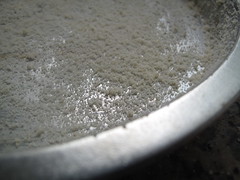




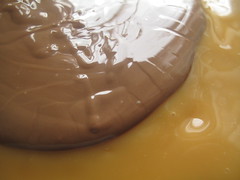


2) Yoghurt Rhubarb pots
Yoghurt – Turkish yoghurt is the BEST Rhubarb Compote Flaked Almonds
All you need to do is assemble these in nice little glasses – yoghurt at the bottom, a bit of compote on top and lovingly garnished with raw, flaked almonds (better than toasted in my opinion). Now if you can’t get hold of Rhubarb, worry not. Find some Ginger jam and use that instead. (I must confess that Ginger jam on Turkish yoghurt with a heavy hand of flaked Almonds is my addicition! And has been for a few months now!!)
My version was inspired the ‘High Tea’ theme/event, hosted by Aparna of My Diverse Kitchen and Meeta of What’s for Lunch, Honey? I didn’t quite read the rules properly and had included some non-vegetarian dishes in my whole plan. Anyhow, those have been very well excised and will be shared later. A lesson to me: read instructions before you spend hours slaving away in the kitchen!




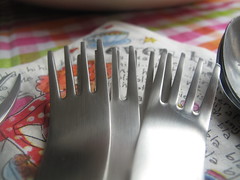

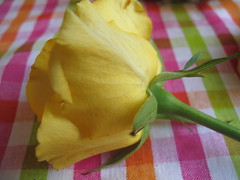

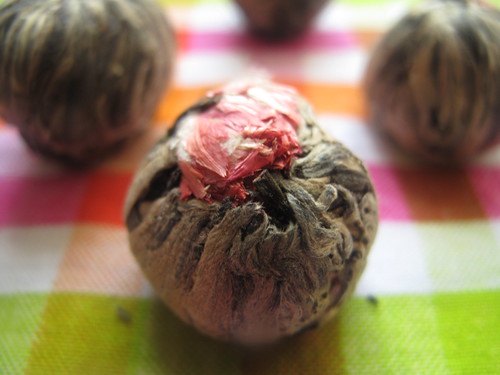
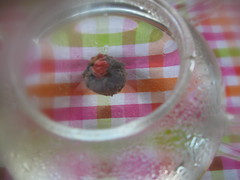
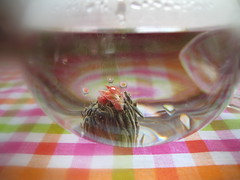
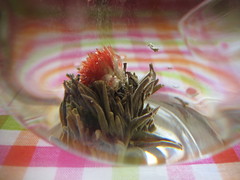













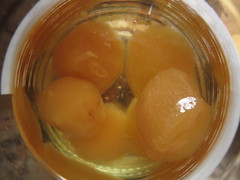


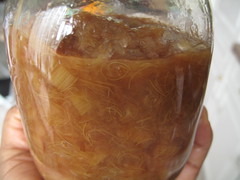






Leave a Reply